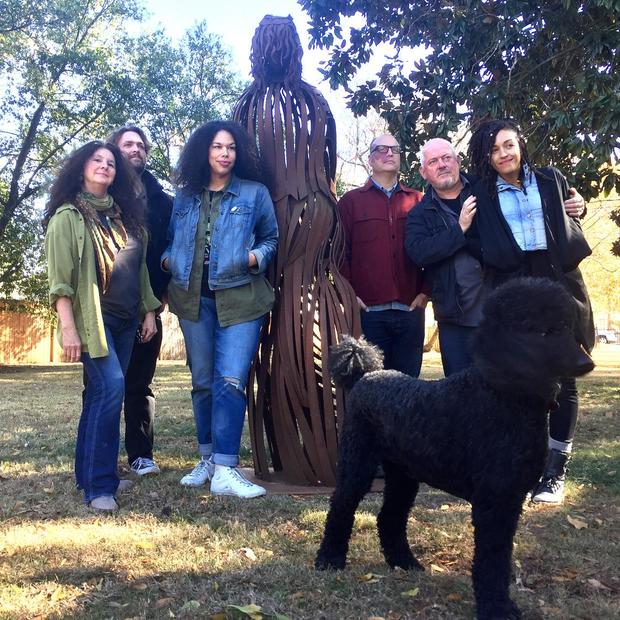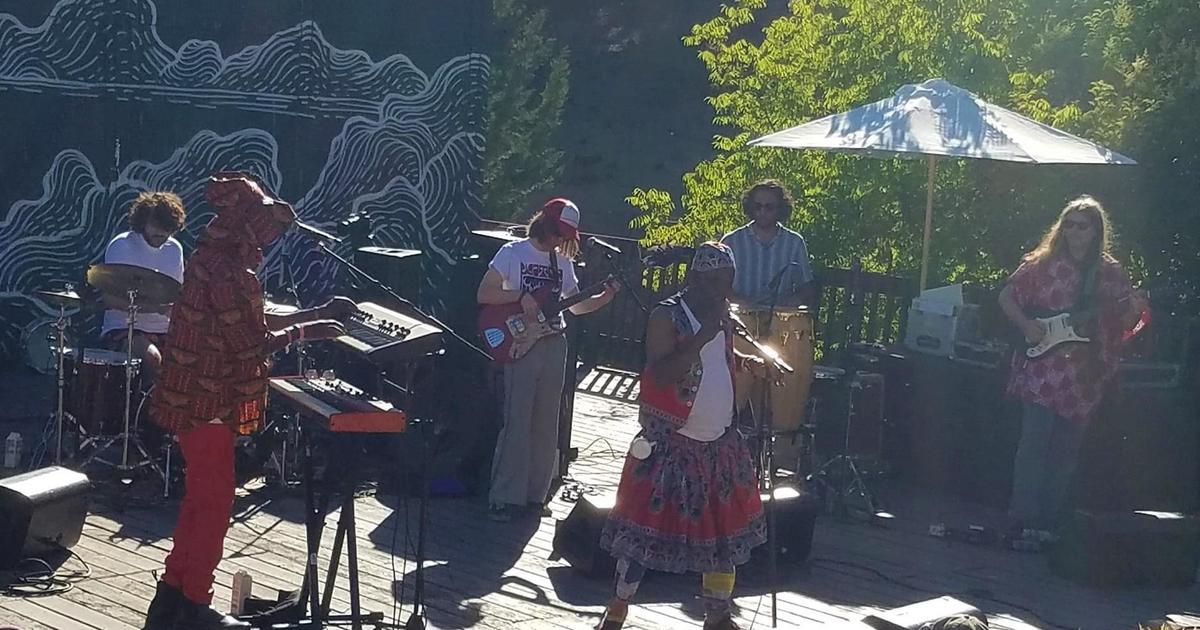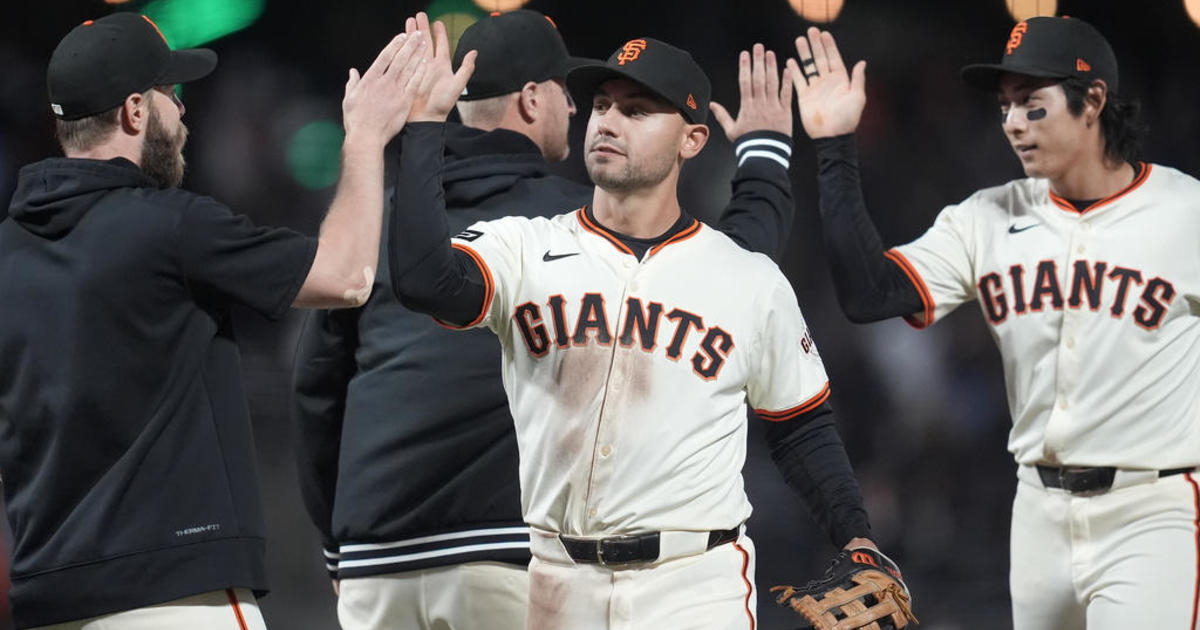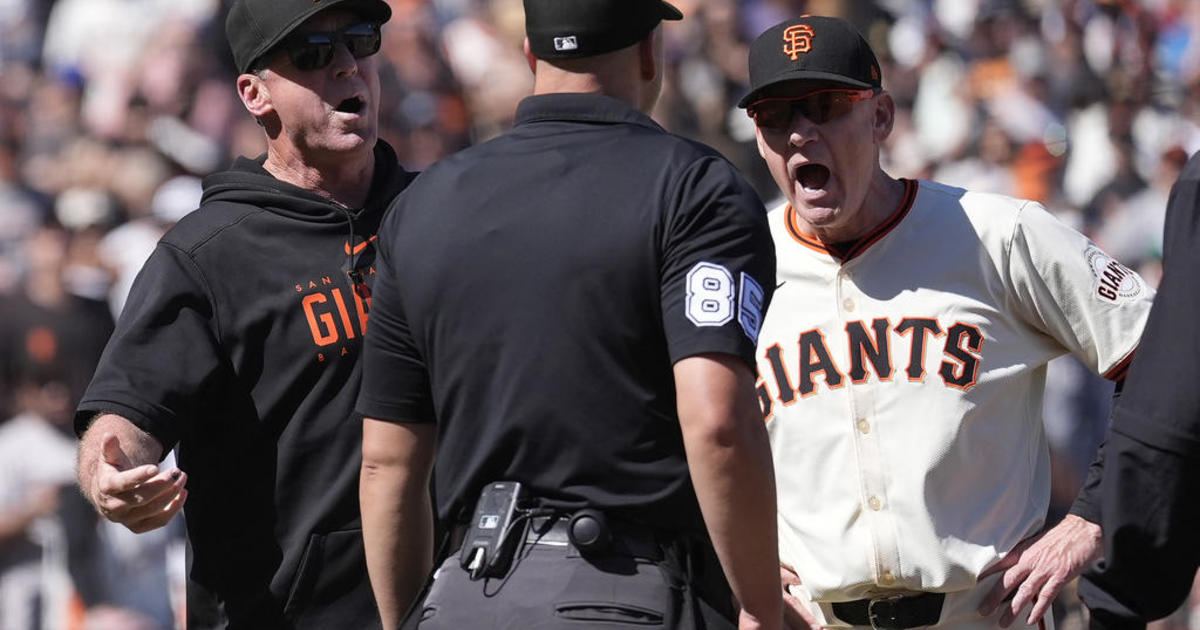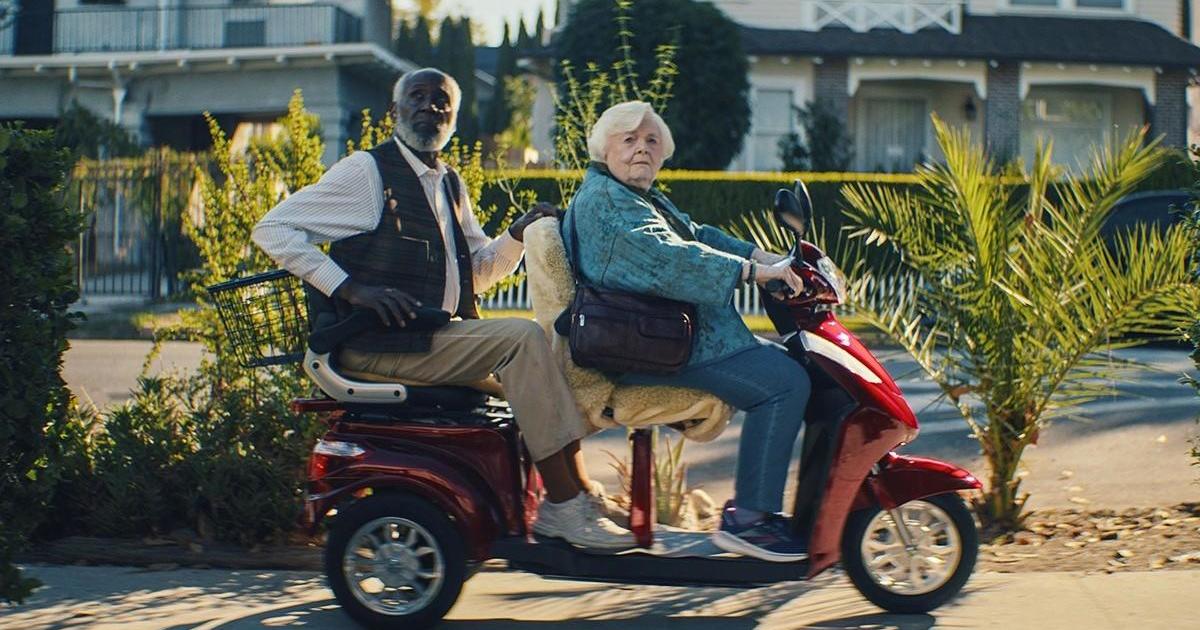CBS SF Talks To Songwriter Jon Langford
By Dave Pehling
SAN FRANCISCO (CBS SF) -- When it comes to musicians who were part of the first wave of punk bands that emerged from the UK in the late '70s, few songwriters have a body of work as diverse as Jon Langford. A founding member of The Mekons when the band formed at the University of Leeds in 1977, Langford played drums on the group's landmark debut The Quality of Mercy Is Not Strnen that was recorded on instruments borrowed from friends and contemporaries the Gang of Four.
While the band would slide into inactivity after a their second album left Virgin Records bewildered in the early '80s, Langford had already taken up playing guitar in the post-punk outfit the Three Johns. He would split his time between the two bands once the Mekons revived to protest the 1984 British miners strike and rail against Prime Minister Margret Thatcher's conservative rule. The Mekons returned with another seminal recording, the country and British folk influenced Fear and Whiskey the following year, pursuing that roots-focused style of punk on subsequent recordings The Edge of the World and Honky Tonkin'.
While the Three Johns dissolved and the Mekons moved back towards more straight-ahead punk rock by the end of the decade, the prolific Langford would soon be pursuing additional creative avenues. Relocating to Chicago with other members of the Mekons early in the 1990s, the songwriter developed a number of collaborative projects with musicians from his newly adopted home. In addition to one-off supergroup Killer Shrews with guitarist Gary Lucas (Captain Beefheart) began recording and touring regularly with the Waco Brothers in 1994, exploring an alternative country sound that would also influence his later work with the Pine Valley Cosmonauts and numerous solo recordings and partnerships.
Langford has been a regular guest at the annual Hardly Strictly Bluegrass Festival, performing with the Mekons, as a guest of the Sadies and with his own groups. The songwriter returns once again this year, performing songs from his latest project and album, Jon Langford's Four Lost Souls. Teaming with fellow Chicago-based musicians Bethany Thomas, John Szymanski and Tawny Newsome, Langford and company decamped to Muscle Shoals, AL, to record a new batch of material with famed Nashville producer (Michael Nesmith, the Flying Burrito Brothers, John Hiatt) and original Muscle Shoals session player Norbert Putnam.
The resulting album mixes the Langford's folk and country influences with elements of gospel, soul and southern rock, taking the songwriter into swampy new territory that at times touches on the sounds of '70s Stax greats the Staples Singers while still maintaining his trademark fiery political message. Langford recently spoke with CBS SF from his home in Chicago, discussing the new recording as well as the myriad of bands he has played with ahead of a string of performances scheduled in San Francisco around the group's appearance at Hardly Strictly Bluegrass 2017 including shows at the Make Out Room and Amoeba Records.
CBS SF: I have to say that as much as I've admired your music, I honestly didn't know how much music there was until I started doing research for this interview. I think I learned of about a half dozen bands you were involved with I had no idea about. But it was very enjoyable research, getting to discover all these different albums while digesting the new recording...
Jon Langford: You don't have to listen to all of it [laughs].
CBS SF: Oh no, I enjoyed it! It was great to explore your wide-ranging body of music. I guess the first question I had was about your regular participation in Hardly Strictly Bluegrass. It seems like you've become a perennial participant like Jimmie Dale Gilmore, Buddy Miller and Emmylou Harris. At this point, do you generally plan your schedule around a trip to SF in early October?
Jon Langford: I make sure I'm not booked anywhere else that weekend, put it that way. I did a benefit show for Warren Hellman up in Truckee. He had this ski place up there. We went in for a weekend. It was a bit of a disaster because there was a blizzard and we had to dash off before we got trapped.
But I managed to play one of the two shows I was supposed to be playing up there. He was there and he enjoyed it very much. At the end of it he said, "I think Jon Langford should come to Hardly Strictly Bluegrass every year!" And there were a lot of people from the festival there [laughs]. So I guess he invited me. It's pretty remarkable. I'm just privileged to do every weekend.
CBS SF: I have questions about the new album and the Mekons, but I wanted to touch on a couple of your other bands as well. One that I've really been enjoying is the Three Johns., the post-punk band that started in 1981 concurrently with the Mekons, though the Mekons took a bit of a hiatus not long afterwards.. Would you say having the Three Johns as a more punk outlet gave you the avenue with the Mekons to explore a more country or roots influenced direction when the band came back with Fear and Whiskey in 1985?
Jon Langford: Yeah, the Three Johns started after the original Mekons... well, we never really split up, but we became inactive for a few years. We [the Mekons] were more interested pursuing more esoteric things like electronic music and roots music. The way the band had been going was one of the reasons for it's demise. We were on Virgin Records and we presented them with an album [Devils, Rats and Piggies: A Special Message from Godzilla] that they didn't have any idea what to do with. We'd all swapped instruments and were making more avant garde music and doing anything we felt like really to keep the whole thing alive.
The Three Johns was something I started when I left college with some guys I'd been hanging out with. It was all about drum machines and me playing guitars, so it was very different from the Mekons. But the Mekons started bubbling back up because we were a social group and they were my friends. There was interest that started around 1980, '81 in the Mekons that came to fruition in 1983 and we started working on Fear and Whiskey.
There was a point where both bands were kind of competing for my time, but I have to say when the Three Johns finally imploded around 1987 or '88, then the Mekons made that album Rock and Roll and that was quite interesting. I still wanted to play the guitar like I played it in the Three Johns.
CBS SF: One band in particular that a friend had tipped me to, Killer Shrews with Gary Lucas. I'm a big fan of his work with Captain Beefheart and later with Jeff Buckley and thought he was on my radar, but I wasn't aware of that band and the album you did. From what I've read, it sounds like that was intended as just a one-off album. Did you play any live shows with Killer Shrews?
Jon Langford: We tried to do it [the Killer Shrews album] in 1988. It would have been much better if we'd done it then, because we were all very keen. But the record company that offered to pay for it went bankrupt and I ended up marooned in Chicago with no way of getting home. We were going to record in Chicago. It actually turned out quite well, because my life kind of turned around and after spending a lot more time in Chicago, it became the place where I finally settled. But that first long couple of weeks in the winter where I was waiting to fly back were quite extraordinary [laughs].
We tried to reconvene a couple of times. Tony Maimone [bassist and founding member of Pere Ubu] worked with the Mekons in 1990-91 and said he'd been working with Gary, so we got back in touch with each other and Gary's record company decided they'd like to do it so we tried to do it again. I think it was in '93 or '94? I can't remember which year it was.
I really liked the songs we had. I thought the songs were great. We worked on them a bit in New York. Actually, making the album was kind of hard work. We tried to do it with a drum machine and then we ended up putting real drums on it. When we went on tour, we realized we wanted to use real drums and not a drum machine. We did a tour in Europe that was truncated and the whole thing fell apart. I've done loads of things with Tony Maimone, but I haven't really seen Gary since then.
CBS SF: As many projects as you have, when you're writing songs do you compartmentalize them as part of the process? Is that when you end up deciding that a song will be a Mekons song or a Waco Brothers song or a song for a solo project?
Jon Langford: I usually write specifically for a project. The Men of Gwent is a project I have in South Wales that I've been doing for years. I write songs specifically for that. Or with the Freakons it would be me and Sally [Timms] and the women from Freakwater and I'd write specifically for that. I don't really write songs for the Mekons; we kind of write things together. And when things just pop into my head and I don't know where they'll go, they'll probably end up on a solo record.
A lot are collaborations, so I'll sit down with the people involved and about what we want and what's needed. Sometimes I don't write songs for ages. For this project [Jon Langford's Four Lost Souls], Norbert [Putnam, Muscle Shoals, AL-based producer and musician] planted the seed in my brain of going to Muscle Shoals. That was the puzzle. I had to sort it out. If I went to Muscle Shoals, what would it be?
In this case, the inspiration came from the studio it was going to be recorded in with the people that Norbert suggested to play on it and the idea that I would have a proper producer for the first time and that maybe I wouldn't play any instruments; maybe I would just sing. Which is what happened. It was a curious thing. But I wrote the songs for that project specifically. There were a couple of older songs that I'd never recorded that I thought could be brought in that fit with it, but eleven of the songs I sat down and thought about it. Kind of like a site specific concept album.
CBS SF: I read in the album info how an exhibit of your art in Nashville led Norbert Putnam to approach you about recording. Is this the first time that your art has led to a musical collaboration?
Jon Langford: Actually, the second album I did with the Pine Valley Cosmonauts, that Bob Wills album we made. I'd gotten obsessed with Bob Wills and made a series of paintings about his life and the aspects of it that interested me in the context of what he did. I think of Bob Wills as one of the great pioneers of American music. And we decided to put a band together to play at the opening. And the band was really good! Not through any fault of mine [laughs]. They were good players. The people who were suggested to me were great. We thought, "Oh, this is fun! Let's make an album then!" So we got all of them to record an album as well.
CBS SF: I know Four Lost Souls was recorded only days after Trump won the election. Was one of the ideas to channel that post-election dread everyone was feeling into it?
Jon Langford: No, the songs were written in that period when it seemed inconceivable that Trump might become president. But in a time when even a Trump candidacy seemed to reflect some of the disintegration and collapse of the institutions we kind of assume are going to protect us.
CBS SF: I imagine the general mood still colored the performances and had some influence that way...
Jon Langford: It absolutely did. We went down with great dread and trepidation. Tawny and Bethany are black women and I don't think they'd spent much time in the South. I don't think they wanted to go to the South the day after Trump was elected.
But we did. And Muscle Shoals was absolutely delightful. We didn't have a cross word with anyone we engaged. We thought we would be mocked in the streets for being Northerners. But people down there were pretty shell shocked by what happened as well.
CBS SF: I would think Muscles Shoals, given its history and the people you were there with, that's almost like going Austin in Texas. It's the South, but a different part of the South.
Jon Langford: They get it. But it is the South. The South is both responsible for this fantastic blooming of everything that I think is great about America, and it also casts this long historical shadow which is really dark. That's what the album is about; that dichotomy. The further I got into thinking about America, the more intense that divide between the politics and the history from the culture. The culture comes from the oppressed. You've got the culture of the oppressor and the culture of the oppressed. It's pretty quirky to work out which side you're on [laughs]. What happened in Muscle Shoals in the '60s is a fantastic model for everything that's right about music making and community and the power of music.
CBS SF: Did you have a pretty good idea of who would sing lead on specific songs prior to getting to Muscle Shoals? I'm thinking you probably ran through the material with your Chicago collaborators prior to the trip...
Jon Langford: Basically, the initial premise was I was going to write some songs. They were kind of weird, punky folk songs. I handed them to Bethany and said, "These are for the Muscle Shoals project. Is there anything in these songs that can be vaguely soulful?" [laughs] She took them away and worked on them with her guitarist John Szymanski.
She brought her demos back to me. I'd said originally that I didn't want it to be me singing lead and them singing backing vocals; I wanted it to be a collaboration between the voices, some parts being like a choir and some parts being like a Dylan Thomas play for voices where people take different parts and there's an actual Greek chorus sort of thing. And that's the way it worked out.
We had that in mind before we went. We did very rough demos and sent them down to the people in Muscle Shoals. I think they're used to a higher quality of demo than what we sent with songs actually finished. What we sent was kind of us smashing around in the basement for them to get an idea of it. I'm used to working a lot of stuff out in the studio. I probably did more preparation for this album than I've done on any other beforehand, but it was still a bit ragged. I think everyone there was actually surprised at how professional we could be when we got there [laughs]. They probably thought a bunch of idiots were going to stumble in screaming.
CBS SF: In another interview from just over a year ago, you aptly described our current president prior to his election as "a breath of foul air." Would you he has lived down to your expectations or is it even worse than you imagined?
Jon Langford: I don't know. I just find it exhausting thinking about it. Now I'm offended every day. It's not so much him; he is what he is. It's the reaction of the supposed respectable people. That the Christians are willing to go along with this? It's kind of useful on some levels because it's drawn away the veneer of all this crudery and pettiness of people in this country. They'll tolerate Trump because he's rich.
It reveals the class divides when there are ICE officers taking people out of hospitals to deport them. It's given people the go-ahead. It's really disgusting. No one can tell me this is a positive thing in this country. It's not just a debasing of all our humanity to get into this. I think it's a symptom of what happens to empires. This country is in demise and it's just a symptom of it.
CBS SF: One friend of mine suggested I ask you about the Lounge Ax in Chicago where you would play after relocating there. My friend mentioned it being kind of an alt-country hub with Jayhawks, Uncle Toupelo and Wilco being regulars. I was wondering if that influenced you or if you had any impressions of that scene in the early '90s?
Jon Langford: I never really thought of it as alt-country. That was a punk rock bar. I thought of it as more of a Touch and Go punk bar, at least among the people I used to hang out with down there. It was open to all sorts, but definitely the idea of anything alt-country didn't happen until the mid-1990s.
In the early '90s, I was down there with bands like Shellac and the Coctails. Nothing that you could vaguely describe as country. The Handsome Family may have played there. But that was something that emerged a little bit later. After the Lounge Ax shut down, it was the Hideout that emerged as the focus of whatever sort of alternative country scene there might have been.
The Lounge Ax was where the Mekons played, but we'd been interested back in 1985 in what people would try to lump us in as alt-country, though they called it "cow punk" back then. We were always kind of steering away from it, but Fear and Whiskey was definitely an album which was cited by a lot of people. But by the '90s, we'd done The Mekons Rock n' Roll and Curse of the Mekons and had been on a major label. I don't think of those as country influenced at all.
CBS SF: The Mekons held their own Mekonsville festival this year and hosted performances of the current version of the band and the reunited 1977 line-up, which also played at the Blackpool Rebellion festival...
Jon Langford: Yeah, Rebellion we just did that with the original line-up with me on drums again. The Mekonsville Festival in Suffolk we had most of the Mekons do solo things and we had the original Mekons and the current band play a few times. And they actually played together as well.
CBS SF: Did it take much time to rehearse that earlier material for the reunion shows?
Jon Langford: It didn't take a very long time to do it in the first place, so we figured possibly people wouldn't come to see the original Mekons expecting a highly professional show [laughs]. So we had one rehearsal and we went and played. We played last November up in Manchester, and then in February we wrote some new material and recorded an album so we'd have something to offer.
CBS SF: I know the Three Johns have also played some semi-regular reunion gigs in the UK. Would that band or the original Mekons line-up be something you'd envision touring the States at some point?
Jon Langford: The bass player [for the Three Johns, Phillip "John" Brennan] won't come. But the original Mekons probably will play somewhere in the States this summer. We're trying to do a Mekonsville 2 somewhere in the U.S.A.
CBS SF: I know you have the Hardly Strictly performance with the Four Lost Souls band scheduled for Saturday. Is the Thursday show you're playing at the Make Out Room going to be a solo set?
Jon Langford: No, that will be the Four Lost Souls band acoustic. And we're doing a thing at the festival with Norbert, playing some of his greatest hits. That's on Sunday, but we'll be there all weekend.
Jon Langford's Four Lost Souls plays the Make Out Room with Tom Heyman and the 22nd Street Irregulars on Thursday, Oct. 5 at 8 p.m. The group also performs at Amoeba San Francisco on Friday, Oct. 6 at 6 p.m. The band plays the Towers of Gold Stage Sunday at Hardly Strictly Bluegrass at 11:45 a.m. Sunday and joins Norbert Putnam and friends at the Bandwagon Stage at 3 p.m.
